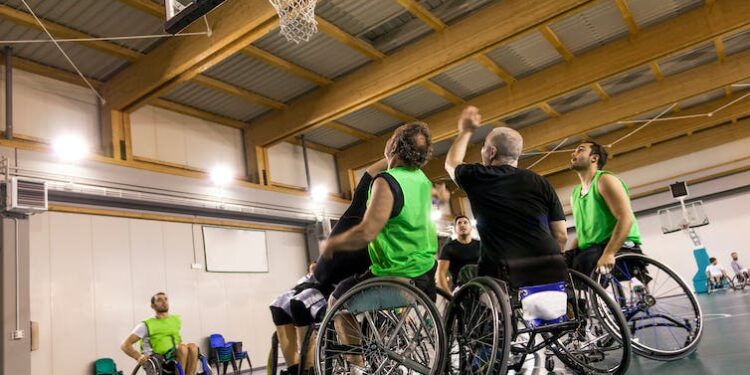This summer marks ten years since London hosted the 2012 Paralympics. It was hoped the Paralympics would have a lasting legacy on improving access to and participation in sports for disabled people. But a look at the data shows the Games have made no meaningful difference in this regard.
One year after the 2012 Paralympics, around 20% of disabled people in England were shown to participate in sports at least once a week. By 2016, this number had declined to only 17%. Ten years on from the Games, disabled people’s monthly participation in sports is still less than half that of non-disabled people in England.
The Paralympics on its own isn’t enough to create change in terms of sporting opportunities for disabled people. Instead, leveraging a sport mega event is vital. This means making deliberate plans to improve sports participation on the back of it – including, crucially, providing opportunities for people to participate in different sports before, during and after the event. Yet the research shows this largely didn’t happen for the 2012 Paralympics – making it a missed opportunity to turn interest in sports into regular participation.
In part, this was because a specific plan to create lasting sporting opportunities for disabled people wasn’t announced until 2010. This didn’t help sports organisations to prepare in terms of having the resources and knowledge to cope with increased demand following the Games. Waiting lists to join clubs weren’t uncommon as a result.
It’s also worth noting that the Paralympics doesn’t necessarily prove inspiring to everyone who may be interested in participating in sport. While some disabled people find the Games empowering and inspiring, for others it may actually be disempowering.
The Paralympics is an exclusive event which only a fraction of disabled people ever qualify to participate in. The achievements of Paralympians may have no relevance in the day-to-day lives of most disabled people, perhaps explaining why they don’t inspire everyone. Research shows that peer role models, rather than Paralympians, are actually more likely to inspire physical activity.
The Paralympics may even perpetuate disability stereotypes, leading to exclusion for those who don’t meet the Paralympic ideal. And since the event isn’t representative of most people’s lived experience of disability, it may lead to an underappreciation of the barriers and challenges that disabled people face.
Room for improvement
The London 2012 Paralympics also relied on the policy of “mainstreaming” to promote sport participation. Mainstreaming is where non-disabled sports organisations offer sporting opportunities for disabled people. The problem has been the lack of clarity as to how this works in practice. Mainstream organisations have sometimes struggled to provide suitable sport opportunities due to a lack of knowledge or resources.
Organisations can sometimes view inclusion as an afterthought, rather than a core commitment. And due to the limited and patchy effectiveness of mainstreaming, there are a number of organisations operating in the sector. This can cause confusion and unnecessary complexity for people looking to get involved in sports. A lack of awareness of sporting opportunities can also be seen as a symptom of the complex landscape of sports for disabled people.
Ableism is also still a problem for many disabled people who want to participate in sports. Many disabled students report feeling excluded from physical education, and institutionalised ableist practices within mainstream sport organisations continue to limit sports access for disabled people.

Marino Bocelli/ Shutterstock
For example, some club settings only fully include disabled people if they can participate in a sport separately to non-disabled people. Disabled people can sometimes be forced to adapt to how the club provides a sport, rather than the club adapting the sport to best meet that person’s needs. Ableism constrains participation by negatively shaping what many people think sport should look like, or who sport is for.
Addressing barriers
It’s clear that simply hosting the Paralympics in 2012 wasn’t enough for improving access and participation in sport for disabled people throughout the UK. To achieve true change, systemic, social, and economic barriers to participation all need to be addressed.
Unfortunately, a number of these barriers still exist and hinder sports participation. The 2012 Paralympics was hosted amid a backdrop of recession and austerity. Austerity measures disproportionately impacted disabled people – with many disabled people limiting their participation in sports due to the fear of losing benefits if they were seen to be active.
And even ten years on, transport is not always accessible to disabled people – a barrier of particular importance when local sporting opportunities may not be available. Some sporting sites are also inaccessible, so even if a person wants to get involved, they may not be able to.
The pandemic has now added another obstacle in the journey to create change – even reversing some of the progress made in recent years. Research suggests there’s now less support to help disabled people to participate in different sports.
The London 2012 Paralympics did help to raise the profile of parasport and disability in society to some extent. But any increases in sports participation that happened as a result were temporary. To truly improve participation in sport, the challenges and barriers that prevent disabled people from participating in both sport and society need to be addressed. We cannot simply rely on a two-week elite sporting event to do this.
![]()
Christopher Brown is the founder of the Disability Sport Info podcast: https://disabilitysportinfo.buzzsprout.com/.






























